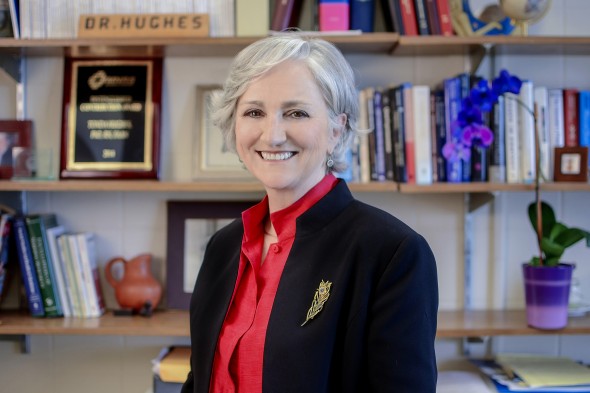Women’s health researcher receives Betty Ford Award

College of Nursing professor Tonda Hughes receives Betty Ford Award from Association of Medical Education and Research in Substance Abuse. Photo: Alicia McConnell Hatch
Tonda Hughes, an internationally known researcher on women’s mental health and substance abuse, will receive the Betty Ford Award from the Association of Medical Education and Research in Substance Abuse.
The award is given to an individual who has made a significant impact on the field of alcohol and drug abuse, particularly in women’s issues, substance abuse education and recovery.
Hughes will be presented with the award at the association’s annual conference in San Francisco Nov. 6.
Hughes, professor of health systems science and associate dean for Global Health in the College of Nursing, has received nearly $20 million in funding over 25 years to study women’s mental health and substance abuse. She was among the first researchers to receive major national funding for research on sexual-minority women’s health, an area identified by the Institute of Medicine as greatly understudied.
“Compared to heterosexual women, sexual-minority women have been shown to be at higher risk for a number of unsafe health behaviors and negative health outcomes, including being overweight, obesity, smoking and substance abuse,” Hughes said.
Her study of risk and protective factors for heavy drinking and drinking-related problems was the first study funded by the National Institutes of Health on sexual-minority women’s drinking behaviors and related risk factors. Now in its 15th year, the study is the longest-running of its kind.
Sexual minorities are one of six population groups identified in the federal Healthy People 2020 report as experiencing major health disparities. The document is the blueprint for national public health prevention and policy goals for the next decade.
“Health disparities among sexual minorities have long been explained on the basis of excess stress resulting from being part of a marginalized and stigmatized population group,” Hughes said. “However, our work on childhood victimization has begun to point to another potentially critical factor underlying these health disparities — mainly, the enduring impact of sexual and physical abuse into adulthood.”
In a recent paper published in the journal Addiction, Hughes looked at the links between victimization and substance use using data from the National Epidemiologic Survey on Alcohol and Related Conditions. She found that compared to women who identify as heterosexual, women who identify as lesbian or bisexual are more than twice as likely to report victimization over their lifetime. Three times as many lesbians as heterosexual women reported childhood sexual abuse.
“Given the enormous impact of childhood victimization on health, this work has major implications for improving the health and quality of life of both sexual-minority and heterosexual populations, and for progress toward eliminating health disparities based on sexual orientation,” Hughes said.
